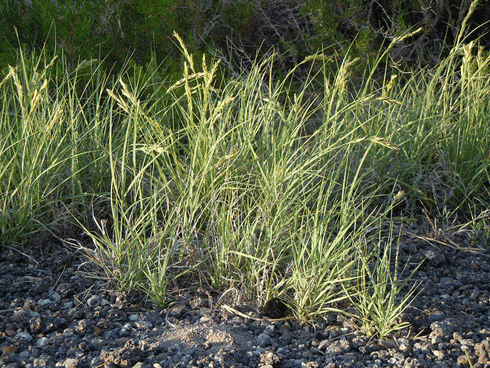
|
Published: 18 March 2013
Saltgrass part of innovative farm-system for saline land
Western Australian researchers are trialling a new way for farmers to manage problems that may stem from inland saline aquaculture to grow marine fish. Working with a constructed wetland, they have been using effluent from saline aquaculture to irrigate a crop plant, which then provides feed for livestock.

|
|
Saltgrass may be the solution to removing nutrients from aquaculture wastewater while producing feed for livestock. Credit: Matt Lavin via flickr (CC BY-SA 2.0)
|
The plant they have been studying – ‘NyPa forage’ – is a commercial cultivar of the saltgrass Distichlis spicata.
Although there is much interest in using saline groundwater to grow marine fish on salt-affected farmland, the disposal of the nutrient-enriched, saline aquaculture effluent poses a major environmental problem.
A/Prof Alan Lymbery from Murdoch University says NyPa was trialled along with various other plants to see how it worked in both extracting the nutrients from aquaculture wastewater and also producing the yield, protein level and digestibility to become a livestock feed.
A/Prof Lymbery says a big problem in WA is salinity ‘so as part of our overall studies we’ve been looking at productive uses for salinised land’.
He says tests show NyPa Forage removes 60–90 per cent of total nitrogen loads and at least 85 per cent of ammonia, nitrite/nitrate, total phosphorous and ortho-phosphorous loads.
‘The plant/soil system takes up the excess nutrients in the water, so you’ve got clean water flowing out but at the same time you’re producing a productive crop.’
The team’s research recently published in the journal Science of the Total Environment – shows that nutritive value was greatest when plants were cropped at intervals of 21 or 42 days.
The project has been trialled in a restricted field situation and A/Prof Lymbery says the next step is to expand it to larger scale farm trials.
‘It needs to be linked in with an aquaculture operation on a farm to test and ensure that we can actually get a crop which livestock can feed upon.
‘We’re looking at land that is so salinised that it can't be used in standard aquaculture enterprises; it doesn't have a lot of ecological value.
‘This is one small part of a whole lot of work that we’re doing trying to conserve freshwater ecosystems, especially in WA.’
Source: ScienceNetwork WA



